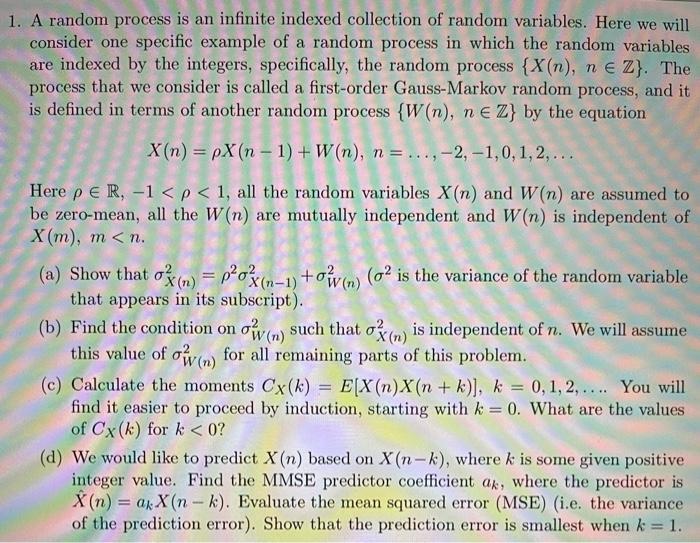Question
1. A random process is an infinite indexed collection of random variables. Here we will consider one specific example of a random process in

1. A random process is an infinite indexed collection of random variables. Here we will consider one specific example of a random process in which the random variables are indexed by the integers, specifically, the random process {X(n), n e Z}. The process that we consider is called a first-order Gauss-Markov random process, and it is defined in terms of another random process {W(n), ne Z} by the equation X(n) = pX(n-1) + W(n), n =..., -2, -1,0, 1, 2,... Here p ER, -1 < p < 1, all the random variables X(n) and W(n) are assumed to be zero-mean, all the W(n) are mutually independent and W(n) is independent of X(m), m
Step by Step Solution
3.46 Rating (153 Votes )
There are 3 Steps involved in it
Step: 1
A Show that oxn poxn1own 02 is the variance of the random variable that appears in its subscript Solution We can calculate the variance of Xn as follo...
Get Instant Access to Expert-Tailored Solutions
See step-by-step solutions with expert insights and AI powered tools for academic success
Step: 2

Step: 3

Ace Your Homework with AI
Get the answers you need in no time with our AI-driven, step-by-step assistance
Get StartedRecommended Textbook for
Probability and Random Processes With Applications to Signal Processing and Communications
Authors: Scott Miller, Donald Childers
2nd edition
123869811, 978-0121726515, 121726517, 978-0130200716, 978-0123869814
Students also viewed these Accounting questions
Question
Answered: 1 week ago
Question
Answered: 1 week ago
Question
Answered: 1 week ago
Question
Answered: 1 week ago
Question
Answered: 1 week ago
Question
Answered: 1 week ago
Question
Answered: 1 week ago
Question
Answered: 1 week ago
Question
Answered: 1 week ago
Question
Answered: 1 week ago
Question
Answered: 1 week ago
Question
Answered: 1 week ago
Question
Answered: 1 week ago
Question
Answered: 1 week ago
Question
Answered: 1 week ago
Question
Answered: 1 week ago
Question
Answered: 1 week ago
Question
Answered: 1 week ago
Question
Answered: 1 week ago
Question
Answered: 1 week ago
Question
Answered: 1 week ago
View Answer in SolutionInn App



